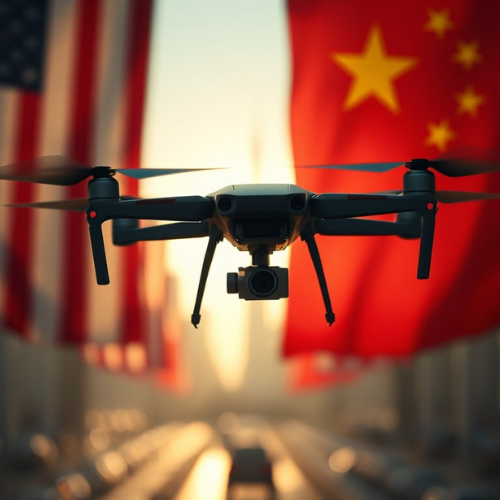The U.S. government is thinking about banning Chinese drones because they might pose a risk to national security. Drone is a small flying machine used for many purposes, like taking pictures, delivering packages, and helping farmers check crops. But the government is worried that some drones could be secretly used by foreign countries like China or Russia to spy on the U.S. or even cause harm.
The Commerce Department, a part of the government, said that China and Russia might use drone to hurt the U.S. in several ways. For example, drones could collect secret information about important places like power plants or bridges. They could also crash into buildings or carry explosives. These risks are why the U.S. is considering stricter rules—or even an outright ban—on drones made in these countries.
China is a big player in the drone business, with companies from there making about 75% of all drones sold in the U.S. This gives them a lot of control over the drone market. Russia, on the other hand, makes fewer drones but has plans to produce more in the future. The U.S. government is concerned that both countries could use their drones to harm America.
How Could Chinese Drones Be a Problem?
Drones have become very advanced in the last 10 years. Many now come with powerful cameras, tools that can track locations, and even artificial intelligence. While this technology is helpful for everyday jobs, like inspecting bridges or helping firefighters, it can also be used for spying or sabotage.
Drone Breach at Sensitive U.S. Base Leads to Arrest of Chinese National
The government is especially worried that Chinese drone companies might be forced to work with their government because of China’s laws. This means these companies could add hidden features to their drones, like software that spies on Americans or disables drones in certain areas. For instance, in the past, some Chinese drones have received software updates that blocked them from flying in war zones.
The Commerce Department said drones could also be hacked remotely. Imagine if a foreign country took control of a drone being used to monitor a wildfire or inspect an oil pipeline—it could create chaos or even endanger lives. This risk is why the U.S. government is now considering new rules to protect critical systems.
What Is Being Done About It?
The U.S. government is asking private companies to share their opinions about the possible ban by March 4. The goal is to figure out how these rules would impact industries that rely on drones. Drones are used by farmers, emergency responders, construction workers, and many others. Banning Chinese drones could make it harder for these people to do their jobs.
The Biden administration has also been working on other ways to protect the U.S. from high-tech threats. For example, last year, they banned certain Chinese software from cars connected to the internet. This was to stop Chinese intelligence agencies from tracking Americans or hacking into important systems like the electric grid.
Chinese Companies Supporting Russian Drone Series Garpiya Sanctioned by US
On Thursday, China responded by adding 28 American companies to its own list of export restrictions. This shows that both countries are taking steps to protect their interests.
Meanwhile, lawmakers in the U.S. have been raising concerns about drones made by specific Chinese companies, like DJI, one of the largest drone makers in the world. A recent government defense bill requires officials to investigate whether these drones are a threat to national security.
The concern about drones is part of a larger issue: cyberattacks. Recently, a Chinese intelligence group managed to hack into several important U.S. companies and even phone lines used by key officials. These attacks are a reminder of how technology, even something as small as a drone, can be used in harmful ways.
By taking these steps, the U.S. hopes to make its systems safer and protect Americans from potential threats caused by foreign technology. For now, the final decision on whether to restrict or ban Chinese drones is still being discussed.


